Personalised Service Meaning for Customer Support Teams in 2025

Personalised service meaning for customer support in 2025 centers on delivering unique, data-driven experiences for every customer. Teams use real-time data to understand customers and solve problems quickly. Technology, including Sobot AI and Sobot call center products, supports agents in providing fast, human help. Sobot Live Chat stands out by unifying conversations and customer details in one place, making service more personal. Companies meet rising expectations by blending AI with human support, as shown below:
| Statistic Description | Percentage / Ratio |
|---|---|
| Customers valuing company experience equally to products | 80% |
| Customers wanting first-contact resolution | 45% |
| Customers expecting human assistance | 99% |
| Customers expecting chat/support agents to assist fully | 80% |
| Decision-makers prioritizing AI for forecasting needs | 1/3 (approx. 33%) |
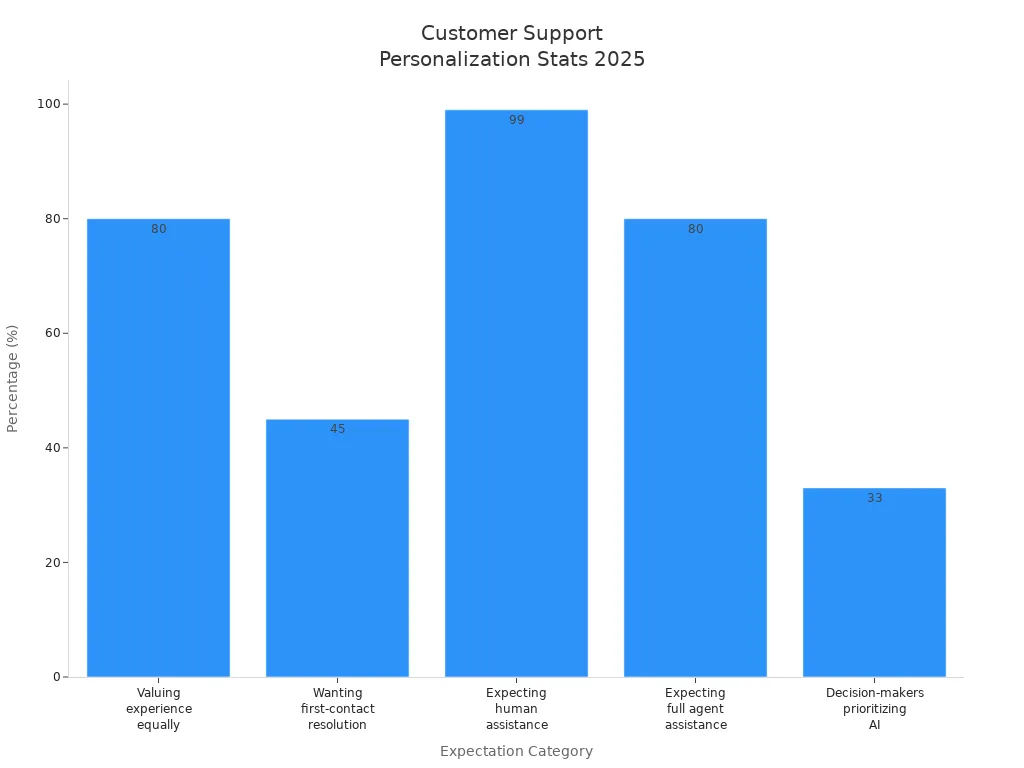
Personalised Service Meaning in Customer Support
Definition and Key Elements
Personalised service meaning in customer support describes how companies tailor every interaction to fit each customer’s unique needs and preferences. In 2025, this approach goes beyond simply knowing a customer’s name or purchase history. It involves using advanced technology, real-time data, and human empathy to create a customer-centric experience that feels both genuine and efficient.
- Personalized customer service in 2025 means:
- Tailoring support to individual needs and preferences, making each customer feel valued.
- Combining AI-driven tools, such as predictive analytics and conversational agents, with human-led interactions to deliver authentic and trustworthy service.
- Delivering the right message at the right time, through the right channel, to show customers they matter.
- Using data ethically and following privacy regulations like GDPR.
- Gathering continuous feedback and using AI-driven sentiment analysis to adjust strategies in real time.
- Ensuring seamless and consistent experiences across all customer touchpoints with an omnichannel approach.
- Training support teams in product knowledge, CRM, and communication skills to deliver tailored solutions.
- Making personalization a brand signature, which builds loyalty and sets companies apart from competitors.
Note: Personalization is not just a feature. It becomes a core part of a brand’s identity, helping companies build trust and long-term relationships with customers.
Key elements of personalized service include:
- Using humanized language to make support feel conversational and relatable.
- Addressing customers by name to create a personal connection.
- Providing custom solutions by leveraging customer data and preferences.
- Creating VIP or loyalty programs that segment customers and offer exclusive benefits.
- Training agents in personalization techniques, such as active listening and empathy.
- Leveraging AI and automation to analyze data at scale for instant, proactive support.
- Asking for and using customer feedback to refine services.
- Anticipating customer needs and addressing issues before they arise.
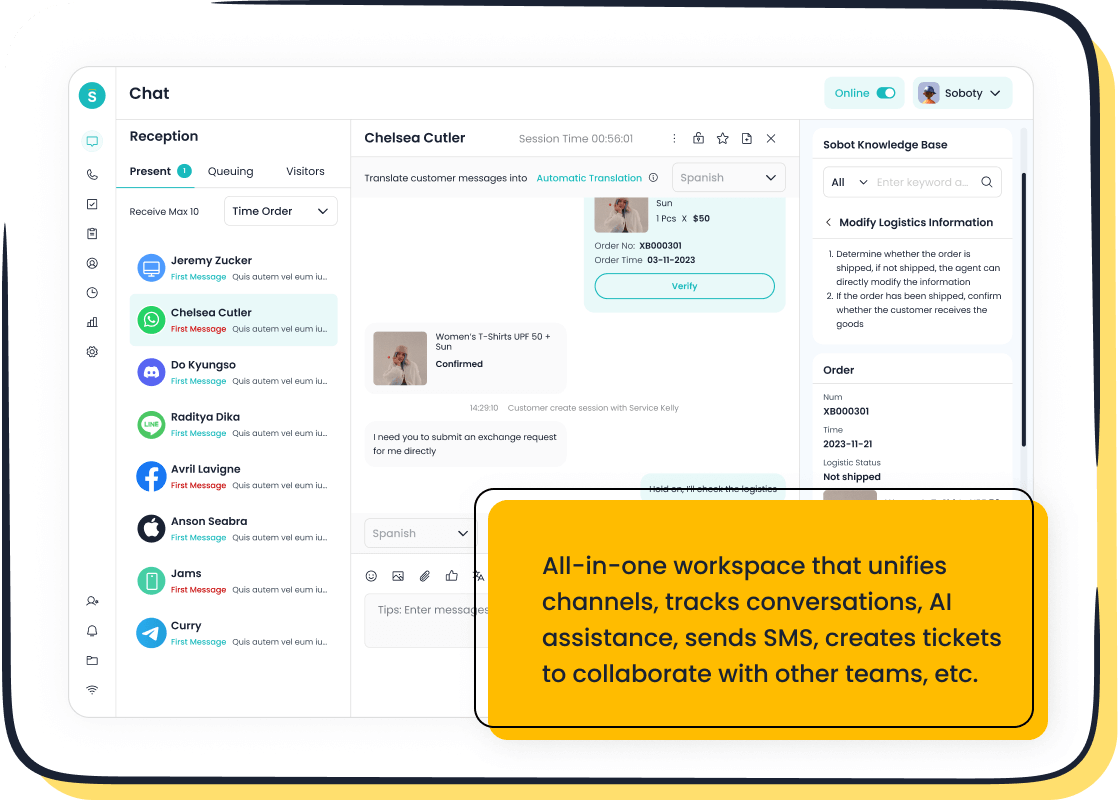
Sobot’s approach to personalized customer service aligns with these industry standards. Sobot Live Chat, for example, unifies all customer conversations and data in one workspace. This allows agents to see a customer’s full history and preferences, making every interaction more relevant and efficient. Sobot’s AI-powered tools help agents respond quickly and accurately, while built-in analytics track over 150 indicators to optimize service quality.
2025 Trends and Innovations
The landscape of personalized service in customer support continues to evolve rapidly. In 2025, several key trends and innovations shape how companies deliver personalized experiences:
- AI agents now handle complex customer service tasks that once required human intervention. This end-to-end automation allows companies to resolve issues faster and more efficiently.
- Conversational AI, combined with workflow automation, enables advanced self-service. Customers can resolve challenging queries, such as disputed credit card charges, without waiting for a human agent.
- Empathetic AI emerges as a major trend. AI systems detect emotional cues, such as tone and sentiment, to provide more human-like and emotionally intelligent responses.
- Integration of AI with centralized knowledge bases allows for personalized, account-specific interactions.
- AI-powered chatbots provide real-time, 24/7 customer support, freeing human agents to focus on complex issues.
- Data integration and real-time analytics drive personalized and hyper-personalized experiences. Brands can tailor every interaction based on comprehensive customer data.
- Omnichannel support ensures seamless communication across platforms like email, phone, social media, and messaging apps.
- Advanced self-service options empower customers to resolve issues independently, improving efficiency and satisfaction.
- Sentiment analysis tools help detect customer emotions and feedback, leading to better service quality.
A recent study shows that 71% of consumers expect personalized interactions, and 46% are willing to spend more for personalized experiences (source). Companies that invest in personalization see higher customer satisfaction and loyalty.
Sobot’s omnichannel solution demonstrates these trends in action. The platform integrates multiple channels—websites, apps, social media, email, phone, and SMS—into one unified workspace. AI-driven tools handle up to 95% of customer interactions, providing 24/7 support and personalized recommendations. Sobot’s AI Copilot assists agents with reply suggestions and summaries, reducing workload by 60%. Automated workflows resolve complex inquiries in under a minute, while marketing automation sends personalized messages to boost engagement and loyalty.
| Aspect | Description |
|---|---|
| Omnichannel AI | Integrates websites, mobile apps, social platforms, email, phone calls, and SMS into one unified platform. |
| Scenario-Based AI | Offers industry-specific solutions for retail, e-commerce, and more, covering pre-sales to post-sales support. |
| Multi-Faceted AI | Supports customers, agents, and administrators with tailored AI tools. |
| Generative AI | Uses advanced language models for accurate, context-aware responses. |
| Secure AI | Ensures global data privacy and compliance. |
| Impact Metrics | 24/7 support, 95% of interactions handled by AI, 60% reduction in agent workload, 15% increase in conversions, CSAT up to 93%. |
| Human-AI Collaboration | Balances AI efficiency with human empathy for a more human-like service. |
Sobot’s Live Chat and Omnichannel Solution help companies deliver a truly personalized customer service experience. By unifying customer data and leveraging AI, Sobot enables agents to provide hyper-personalized, seamless service across all channels. This approach drives customer loyalty and revenue growth.
Tip: Companies that use AI-driven omnichannel solutions, like Sobot, see faster issue resolution, a 25% increase in customer satisfaction, and a 30% reduction in support costs.
Personalized service meaning in 2025 centers on creating a customer-centric experience that combines technology, data, and human empathy. Companies that embrace these trends and innovations set themselves apart, building stronger relationships and achieving better business outcomes.
Why Personalized Customer Service Matters
Customer Satisfaction and Loyalty
Personalized customer service shapes how customers feel about a brand. When companies use personalization, they show customers that each person matters. This approach builds trust and makes customers feel special. Many studies highlight the strong link between personalized service and customer satisfaction.
- Personalized touchpoints, such as using a customer's name or remembering past purchases, improve the customer experience.
- Personalization affects every stage of the customer journey, from first contact to after-sales support.
- The impact of personalization depends on how and when companies use it. For example, a quick, friendly reply during a support chat can turn a problem into a positive experience.
- Customer-specific factors, like privacy concerns or trust, can change how much personalization helps.
- Companies that listen to feedback and adjust their service see higher customer satisfaction.
A recent review of 293 articles found that personalization always influences the customer experience. Customers who receive personalized service report higher satisfaction because their needs are met quickly and in a way that feels unique to them.
Companies that focus on customer intimacy build stronger customer relationships. They understand what customers want and deliver it in a way that feels personal.
Sobot helps brands achieve this level of service. For example, Sobot Live Chat lets agents see all customer data in one place. This means agents can greet customers by name, remember past issues, and offer solutions that fit each person. Sobot’s AI tools also help agents respond faster and more accurately, which leads to happier customers.
A real-world example comes from Michael Kors. After using Sobot’s all-in-one platform, Michael Kors reduced response times by 83% and reached a 95% customer satisfaction rate. The brand also saw a 20% increase in conversion rates. These results show how personalized customer service can turn regular customers into loyal fans.
Personalized customer service also boosts loyalty. Research shows:
| Customer Loyalty Metric | Impact of Personalized Service |
|---|---|
| Customer Engagement Rates | Increased through tailored interactions based on customer preferences and past behavior. |
| Customer Satisfaction Scores | Improved by delivering relevant, proactive, and consistent support experiences. |
| Net Promoter Scores | Enhanced as customers feel valued and understood, leading to higher likelihood of recommending the brand. |
| Customer Effort Scores | Reduced by seamless omnichannel experiences and proactive support, making interactions easier for customers. |
| Customer Retention Rates | Boosted by building trust through dynamic personalization and consistent messaging across all touchpoints. |
- 82% of consumers say personalized experiences influence their brand choice in at least half of shopping situations.
- 61% of consumers are willing to spend more with companies that customize their service.
- Companies that prioritize personalization are twice as likely to have top-performing customer experience programs.
Personalized customer service creates positive experiences that keep customers coming back. When customers feel understood, they are more likely to recommend the brand to others. This loyalty leads to long-term customer relationships and higher customer intimacy.
Business Impact and Growth
Personalized customer service does more than make customers happy. It also drives business growth. Companies that invest in personalization see real results in revenue, retention, and overall performance.
| Business Growth Metric | Statistic |
|---|---|
| Revenue increase from personalization | Fast-growing companies generate 40% more revenue than slower-growing competitors |
| Consumer spending increase | 80% of businesses report increased consumer spending averaging 38% more with personalization |
| Customer retention improvement | 62% of business leaders report improved customer retention due to personalization efforts |
| Customer satisfaction increase | 52% of consumers report higher satisfaction as experiences become more personalized |
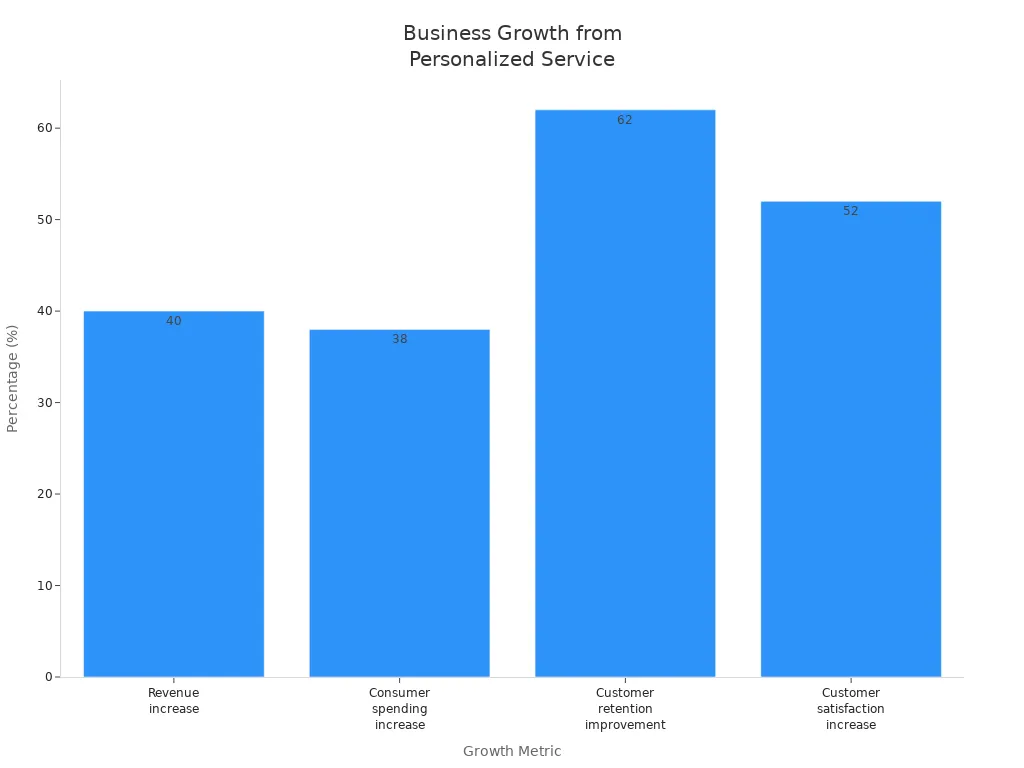
Personalization helps companies grow faster than their competitors. Fast-growing companies generate 40% more revenue by using personalized customer service. When customers receive personalized experiences, they spend more money. In fact, 80% of businesses report that customers spend an average of 38% more when they feel the service is personalized.
Customer retention also improves with personalization. 62% of business leaders say their companies keep more customers because of personalized service. This means fewer customers leave for other brands. Higher retention leads to steady growth and lower costs for finding new customers.
Sobot’s solutions make this growth possible. Sobot’s omnichannel platform brings together all customer channels, so agents can deliver seamless, personalized support. The platform uses AI to automate simple tasks, freeing agents to focus on complex issues. Built-in analytics help companies track customer satisfaction and make data-driven decisions. These features help businesses increase revenue, improve customer retention, and build stronger customer relationships.
Michael Kors provides a clear example of this impact. By using Sobot’s platform, the brand unified its customer service channels and improved marketing outreach. The result was a 20% increase in conversion rates and a 95% customer satisfaction rate. These numbers show how personalized customer service can drive both loyalty and business growth.
Personalized customer service is not just a trend. It is a proven strategy for building customer intimacy, increasing satisfaction, and driving business success.
Personalized customer service matters because it creates a cycle of positive experiences, loyalty, and growth. Companies that use personalization build lasting customer relationships and stand out in a crowded market. Sobot’s tools and platforms help brands deliver the personalized experiences that today’s customers expect.
Standards for Personalized Service
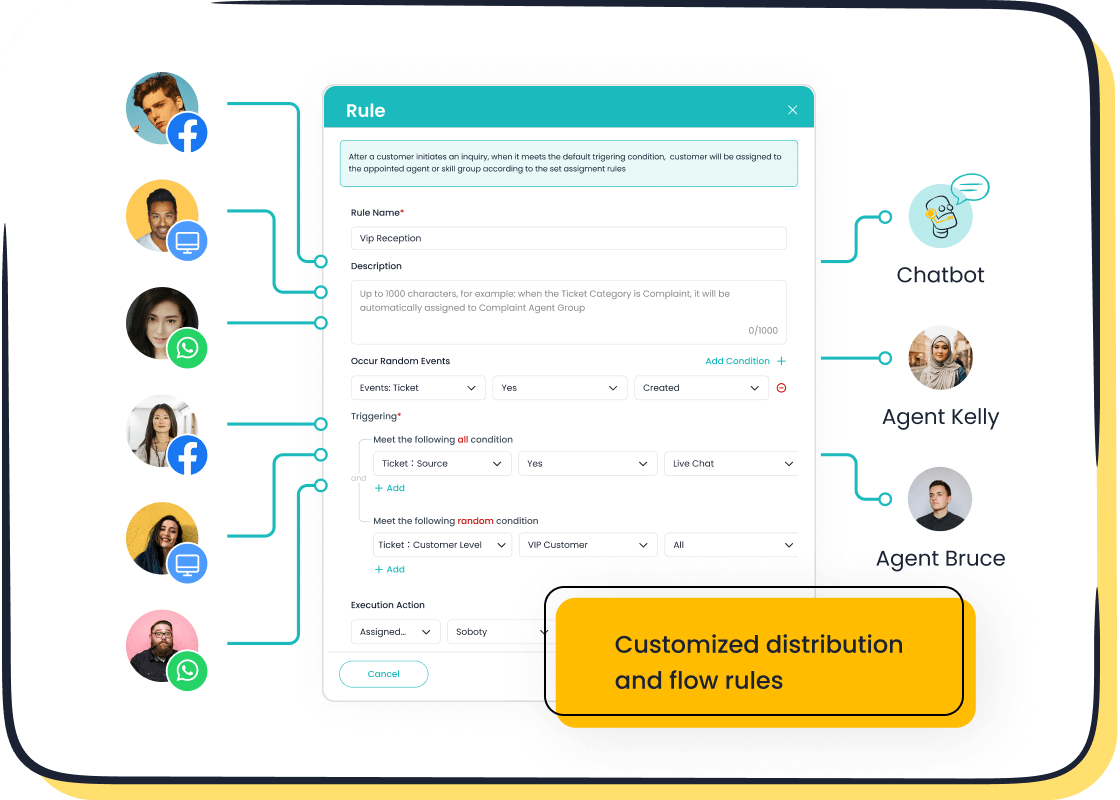
Customer Expectations
Customers in 2025 have clear standards for what personalized service meaning is in customer support. They want companies to know their history and needs. Most customers expect fast, friendly, and proactive help. The following list shows what customers look for:
- 87% expect personalized interactions based on their history.
- 79% want companies to anticipate their needs.
- 77% demand proactive support.
- 72% are open to AI-powered agents for faster responses.
- 86% try online self-service before contacting a live agent.
- 71% feel valued when companies respect their time with quick answers.
- 59% change channel preference depending on the situation.
- 56% still prefer phone support for human interaction.
- 82% expect quick issue resolution.
- 56% want their issue resolved in a single interaction.
- 70% expect seamless experiences across all channels.
- 90% consider immediate response important, with 60% defining immediate as within 10 minutes.
These expectations show that personalized service meaning goes beyond using a customer’s name. Customers want companies to use data, AI, and human empathy to deliver fast, relevant, and seamless support.
Industry Benchmarks
Industry benchmarks help companies measure how well they deliver personalized service meaning. Leading teams track key metrics to see if they meet or exceed customer expectations. Common benchmarks include:
- Customer Satisfaction Score (CSAT): Good scores range from 75% to 85%. Top companies aim for 85% or higher.
- Net Promoter Score (NPS) and Customer Effort Score (CES): These scores show how likely customers are to recommend a brand and how easy it is to get help.
- First Response Time: Fast replies show attentiveness. Many customers expect a response within 10 minutes.
- Resolution Time: Shorter times mean better service.
- Customer Retention Rate and Customer Lifetime Value (CLV): High rates show strong loyalty and effective personalized service.
| Metric | Description | Role in Personalization |
|---|---|---|
| CSAT | Customer satisfaction after support | Direct feedback on service quality |
| First Response Time | Time to first reply | Shows attentiveness to individual needs |
| Resolution Time | Time to solve the issue | Faster solutions improve satisfaction |
| Multichannel Support | Support across channels | Meets customers where they are |
| Self-Service Options | FAQs, chatbots, knowledge base | Empowers customers and personalizes experience |
Sobot’s omnichannel platform helps companies meet these benchmarks by unifying customer data and channels, using AI to speed up responses, and providing analytics to track performance.
Overcoming Challenges
Delivering personalized service meaning comes with challenges. Teams must balance technology, data privacy, and human touch. Common obstacles include:
| Challenge Category | Description |
|---|---|
| Real-time Cross-channel Delivery | Hard to automate and integrate data across channels and teams. |
| Technological Complexity | Many tools make it tough to choose and connect the right systems. |
| Metrics Measurement | Difficult to track both short-term and long-term success. |
| Balance of Personalization | Too much personalization can feel intrusive. |
| Scalability | Hard to deliver at scale across regions and platforms. |
| Privacy and Regulations | Must follow data privacy laws and keep customer trust. |
| Non-unified Customer Profiles | Lack of a single view of the customer across channels. |
Successful teams use several strategies to overcome these challenges:
- Use CRM tools to personalize interactions based on customer history.
- Train agents to listen and respond with empathy.
- Segment customers to tailor support.
- Leverage AI and automation for routine tasks, letting agents focus on complex issues.
- Balance automation with human support, especially for sensitive matters.
- Collect feedback and refine processes regularly.
Sobot’s unified workspace and AI-powered tools help support teams overcome these barriers. By integrating channels and data, Sobot enables fast, accurate, and personalized service at scale, meeting both customer expectations and industry benchmarks.
Delivering Personalized Service with Sobot
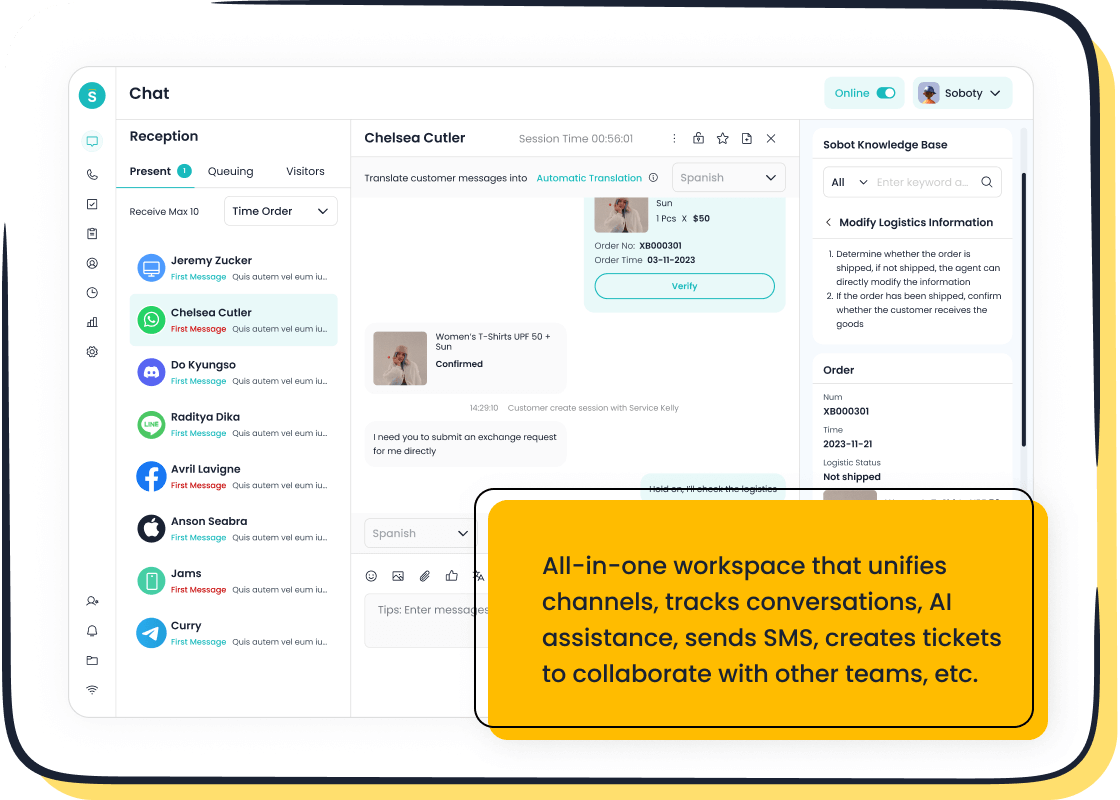
AI and Automation
Sobot uses advanced AI and automation to deliver personalized service at scale. The platform adopts an AI-First strategy, blending automation with human-like empathy. AI chatbots operate 24/7, providing multilingual and proactive engagement. These bots handle routine questions, freeing agents to focus on complex issues. Sobot’s AI copilots assist agents by drafting replies and summarizing conversations, which increases efficiency and accuracy. Emotion AI detects customer feelings and responds with empathy, improving satisfaction and loyalty. Companies using Sobot’s AI report up to a 95% customer satisfaction rate. Predictive analytics and real-time insights help teams anticipate needs, making every interaction more personalized.
Omnichannel Support
Sobot’s Omnichannel Solution enables seamless personalized service across all channels. The unified workspace brings together live chat, email, social media, and phone support. Agents see a complete customer profile, including past interactions and preferences. This approach ensures consistent personalization, no matter where the customer reaches out. Real-time translation and multi-language support allow agents to serve customers globally. Intelligent routing connects customers to the right agent quickly. Customization options, such as chat flows and business hours, help teams tailor the experience. Best practices include integrating all communication channels and maintaining consistent brand messaging for a cohesive journey.
Data-Driven Insights
Sobot empowers teams with data-driven insights to enhance personalization. The platform tracks over 300 indicators, offering configurable dashboards and customizable reports. AI-powered analytics monitor customer satisfaction and identify trends. Predictive modeling helps teams spot at-risk customers and those likely to buy, allowing for proactive engagement. Unified customer data platforms ensure high data quality and governance. These insights enable automated experience optimization and real-time feedback. Industry data shows that 62% of companies see significant improvements in personalization with AI, and 73% of shoppers believe AI enhances their experience (source).
Agent Training and Empowerment
Sobot supports agent training with tools that drive personalized service. One-on-one coaching, real-time feedback, and performance reviews help agents improve. Sobot’s call recording and analytics provide actionable feedback. Role-play and scenario-based training build confidence and communication skills. Gamified learning and AI-powered coaching increase engagement and knowledge retention. Clear expectations and continuous learning ensure agents deliver consistent, personalized support. Empowered agents use Sobot’s unified workspace and AI tools to personalize every interaction, boosting customer satisfaction and loyalty.
Personalized Service Success Stories
Michael Kors and Sobot
Michael Kors, a global fashion brand, faced challenges in managing customer support across many channels. The company wanted to improve efficiency and deliver personalized customer service at scale. Sobot provided a solution that unified all communication channels and automated key parts of the shopper journey. The table below shows how Sobot addressed specific challenges for Michael Kors:
| Challenge Addressed | Sobot Solution Feature | Result / Impact on Michael Kors |
|---|---|---|
| Multi-channel communication complexity | Immediate multi-channel response capabilities | Over 30% improvement in customer satisfaction scores |
| Personalized customer engagement | Personalized promotions | Over 35% increase in Net Promoter Score (NPS) |
| Shopper journey management | Automated shopper journey management | Over 15% boost in conversion rates |
| System stability and scalability | 99.99% system stability, handles large volumes | Enables seamless service despite complex tech needs |
| Rising customer expectations | User-friendly, dependable platform | Faster problem resolution and enhanced customer experience |
Sobot’s platform helped Michael Kors improve customer satisfaction, boost conversion rates, and manage high volumes of support requests without losing the personal touch.
Other Industry Examples
Agilent Technologies, a leader in life sciences, also used Sobot to transform its support operations. By combining AI-powered chatbots, intelligent routing, and analytics, Agilent increased operational efficiency sixfold and reduced costs by 25%. The company achieved a customer satisfaction score of 95%. This example shows that personalized customer service works in both retail and specialized industries.
A clinical environment user praised Sobot’s intuitive interface and strong partnership approach. The user noted that Sobot acted as a caring team member, helping manage high volumes of sensitive communications while maintaining empathy and trust.
Key Takeaways
- AI voice assistants can handle up to 40% of customer calls, reducing agent workload.
- Integration with CRM and real-time data enables accurate, personalized customer service.
- Smart escalation sends complex issues to human agents with full context.
- Automation reduces average call handling time by 20% and increases satisfaction.
- Companies see long-term benefits, such as higher retention and loyalty, when they deliver consistent, personalized customer service.
Companies that use Sobot’s solutions gain efficiency, save costs, and build lasting customer relationships through personalized customer service.
Personalized service meaning shapes customer support in 2025 by driving satisfaction, loyalty, and business growth. Sobot’s Live Chat delivers a 92% satisfaction rate and a 305% ROI, showing real impact on customer experience and revenue. Teams can:
- Use AI and unified data for tailored support
- Monitor performance and adapt quickly
- Foster collaboration for continuous improvement
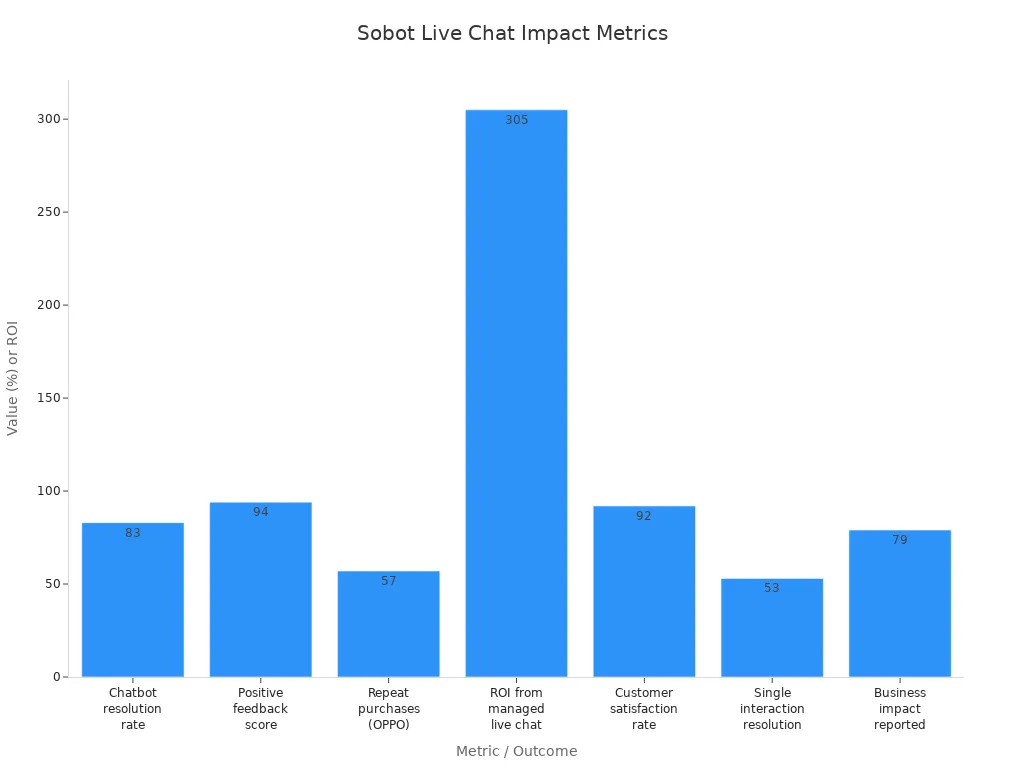
Future-ready teams explore Sobot solutions to deliver exceptional, personalized service meaning across every channel.
FAQ
What does personalized service meaning refer to in customer support?
Personalized service meaning describes how support teams tailor help for each customer. They use data, preferences, and past interactions. Sobot Live Chat, for example, lets agents see full customer histories. This approach increases satisfaction and loyalty. Source
How does Sobot help teams deliver personalized service meaning?
Sobot provides a unified workspace. Agents access all customer data, chat history, and preferences in one place. AI tools suggest replies and automate tasks. This setup helps teams deliver fast, accurate, and personalized service meaning across every channel.
Why is personalized service meaning important for business growth?
Personalized service meaning leads to higher customer satisfaction and loyalty. Companies using personalization see up to 40% more revenue growth. Sobot’s clients, like Michael Kors, report a 20% increase in conversion rates after improving their personalized service meaning.
Can AI improve personalized service meaning in customer support?
AI analyzes customer data and predicts needs. Sobot’s AI chatbots handle routine questions and provide instant answers. This technology allows agents to focus on complex issues. AI-driven support raises satisfaction scores and helps teams scale personalized service meaning.
What channels support personalized service meaning with Sobot?
Sobot supports websites, apps, WhatsApp, Facebook, Instagram, Telegram, and Discord. Agents manage all conversations in one place. This omnichannel approach ensures consistent personalized service meaning, no matter where customers reach out.
See Also
Artificial Intelligence Agents Transform Customer Support Services
Enhance SaaS Customer Support Using Live Chat Techniques
Ways AI-Powered Customer Service Software Improves Efficiency
